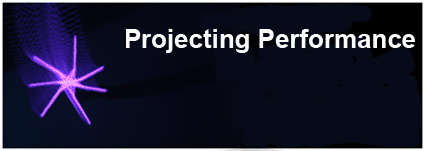
This project investigates a new set of
interrelationships between performer, projection and technical operator,
where the operator also becomes a ‘performer’ both controlling
and being spontaneously present in the digital image on stage. The stage-performer
interacts with the off-stage operator, who simultaneously sees, controls
and 'performs' the projected image in the stage 'picture'. The expressive
nature of the digital image concentrates the quality of the operator's movement
through abstract forms that are choreographed with the stage performer.
Work that directly integrates performance and technologist in both process and
performance is still rare. Collaborative methods that facilitate such integration
deserve further exploration for the combined benefit of both academic and professional
communities. Through this research we are seeking to identify the underlying
processes of our work as collaborators from the fields of performance and new
technologies, within the context of a performance research laboratory. How do
our working practices complement each other, and where do we need to compromise
or find alternative approaches?
This research project has critical implications for relationships between humans and technology in 21st century choreography and scenography. The developing dialogue between performance and technology will further expose methodologies for collaborative research.
Project dates: 1st September 2006 to 31st January 2008
Projecting Performance is a collaboration between performance academics from the School of Performance & Cultural Industries and digital technologists from KMA Creative Technology Ltd. This AHRC-funded project focuses on the choreographic and scenographic exchange between dancers and projected digital images within a theatrical context. It questions processes of performance and perceived boundaries between performers and technologists, and instead it promotes dialogues in an iterative cycle of creative development. The research addresses these issues at different levels:
- What
defines the relationships between the performer-dancer, the projected iimage
and the
performer-operator?
- What
are the methodologies for the engagement of performance academics and digital technologists
in effective collaborative research?